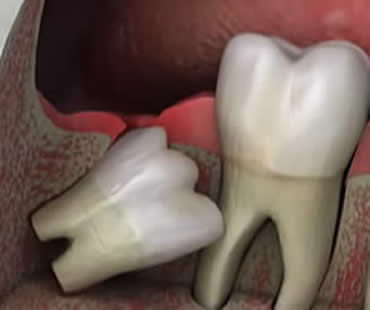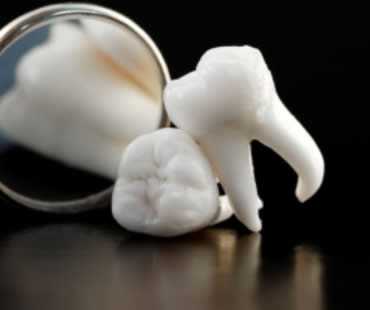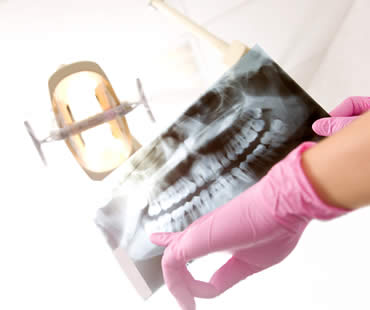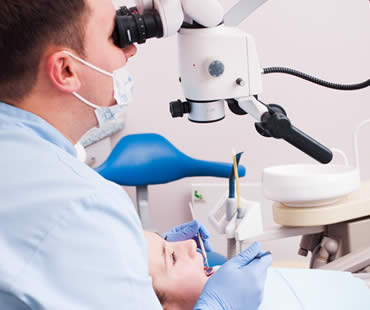
Also called third molars, wisdom teeth are the last set of teeth to erupt. Usually, people get their wisdom teeth in during their late teens and early 20s. Although some individuals have no trouble with their wisdom teeth, many people end up having these teeth removed because they may become impacted and create dental health issues. Learn more about wisdom teeth with this Q and A:
Do I need to have my wisdom teeth removed?
If your wisdom teeth aren’t causing problems, you can leave them alone. Typically, wisdom teeth are crooked or impacted, which can generate problems with the surrounding teeth. Also, wisdom teeth can be harder to keep clean, so the risk of decay on these teeth is higher.
When should I have these teeth taken out?
For optimal results, most dentists recommend wisdom teeth removal for patients when they are between 16 and 22 years old. The formation of the roots isn’t complete, so you have fewer complications.
Are there any risks?
As with any surgery, you can have issues arise, but the biggest concerns are nerve damage and dry sockets. Older patients have a greater chance of nerve damage because the root has more fully developed. Dry sockets occur when the post-surgery blood clots dislodge.
Does my age matter?
Some adults don’t experience any symptoms until they are in their 30s, 40s, or 50s. You can have these teeth extracted at any point, but when you get older, surgery is more difficult and the recovery takes longer. If you have trouble with your wisdom teeth, contact your dentist right away for a complete exam.
Ottawa dental office for wisdom teeth – PermaSmile!

While minor gum recession can be treated by your dentist with deep cleaning and antibiotics, serious gum recession can only be treated with oral surgery. A loss of bone and gum pockets that are very deep require gum surgery to address the pain and damage left by acute gum recession.
Three treatments are used primarily in the treatment of serious gum recession, in order of invasiveness: pocket depth reduction, regeneration, and soft tissue graft. Pocket depth reduction involves a deep cleaning of the affected area. The periodontist folds the gum tissue back and utilizes tooth scaling and root planing to remove any tartar and plaque built up around the tooth. Once the gum pockets are clean, the surgeon pulls the gum tissue gently around the tooth, eliminating the deep pockets altogether or significantly reducing their depth.
Regeneration utilizes a similar treatment to pocket depth reduction, but it also addresses any bone loss that occurred due to acute gum recession. In this process, a regenerative agent such as graft tissue, membranes or tissue stimulating proteins is added to the affected area. The gum tissue is then tucked into place and stitched down. Over time, the regenerative agent will work to rebuild lost bone and tissue, leaving healthy and thriving tissue behind.
The most common soft tissue graft is taken from the patient’s own mouth, either by removing tissue from the roof of the mouth or from the gum tissue near the affected tooth. The healthy gum tissue is placed in the affected area, over the exposed tooth root, protecting it from infection and damage.
To prevent the need for oral surgery to address your receding gums, have good oral hygiene habits. Brush, floss and see your dentist twice a year for checkups and professional cleanings. Talk to your dentist if you have any other questions about how to reverse or prevent gum recession.
If you need a dentist in Ottawa contact us today

Wisdom teeth are the third set of molars and the last adult teeth to erupt into the mouth. Most people have four wisdom teeth, two on the bottom and two on top. Many people do not have enough room for these molars to emerge completely, causing them to become impacted in the gum. Impacted wisdom teeth are difficult to clean, making them more susceptible to decay and disease. Other dental problems caused by impacted wisdom teeth include pain, damage to surrounding teeth, and bite alignment issues. For these reasons, your dentist may recommend having the impacted teeth removed to prevent future problems.
Surgery to extract an impacted wisdom tooth or set of wisdom teeth is usually an outpatient procedure done in your dentist or oral surgeon’s office. If the tooth or surrounding area are deemed to have an infection prior to the procedure, surgery will be delayed, and your dental professional will likely prescribe antibiotics to help heal the area.
On the day of surgery, local anesthesia will be administered to numb the area where the extracted tooth will be removed. Depending on the severity of your case, your dentist or oral surgeon may also utilize a general anesthetic.
Once the anesthesia has taken effect, an incision will be made to open up the gum and any bone blocking the tooth will be removed. Your dentist or surgeon will then separate the tissue connecting the bone to the tooth and extract the tooth. Some teeth are too large to remove in one piece, in which case your surgeon will cut the tooth into smaller pieces to make it easier to remove. Finally, the incision is closed with stitches and packed with gauze to help alleviate bleeding.
Long-term complications from impacted wisdom tooth surgery are rare. To ensure a successful recovery from this or any oral surgery, be sure to follow all aftercare instructions provided by your dentist or oral surgeon.
Our dental office is located in Ottawa

Wisdom teeth are the third set of molars, and usually emerge in the late teens or early twenties. Standard dental practice is to remove wisdom teeth prior to them being fully formed when the roots have not yet had a chance to develop and fully root into the jaw. Younger patients usually have an easier recovery from surgery and many dentists believe early removal prevents future dental problems associated with wisdom teeth.
If your wisdom teeth were not removed as they emerged, there are some signs and symptoms that would indicate the need for extraction including:
- Wisdom teeth that are impacted, which means they have become trapped in the jawbone or gums.
- Wisdom teeth that are emerging at an awkward angle, causing pressure on adjacent teeth.
- Wisdom teeth that do not fit in your mouth, causing crowding of the surrounding teeth as well.
- Wisdom teeth that are suffering from decay or disease caused by the inability to keep them cleaned properly.
- Wisdom teeth that have developed fluid-filled cysts near the gumline.
- Wisdom teeth that are causing pain due to any of the above reasons.
The decision about whether or not to remove your wisdom teeth should be made in consultation with your dental professional. Your dentist or oral surgeon can assess the position and health of your wisdom teeth and make a recommendation for treatment.
If extraction is recommended, they may choose to extract one tooth or all four molars at once. Recovery from the outpatient procedure takes just a few days, and you will quickly be back to normal. Contact our dental office if you are experiencing any of these symptoms listed to determine if you should consider wisdom tooth removal to ensure your future good oral health.

Oral surgery to correct problems with the jaw is known as orthognathic surgery. Jaw issues can result from birth defects, changes due to growth, or injury or trauma to the face. While orthodontics can correct bite problems when only the teeth are involved, oral surgery may be required when repositioning of the jaw is necessary to correct the issue. If you suffer from any of the following concerns, orthognathic surgery may be a consideration:
- Difficulty chewing, biting or swallowing
- Problems with opening and closing your mouth, or with speaking
- Persistent jaw or temporomandibular joint pain
- Clenching or grinding of teeth causing excessive wear to the teeth
- Inability to make the lips meet without straining
- Un-proportional facial appearance or protruding jaw
- Malocclusion, open, or incorrect bite
- Recessive lower jaw and chin
- Sleep apnea and breathing problems
Most jaw surgeries are performed completely in the mouth, so no facial scars are visible. The oral surgeon makes cuts in the jawbone and then moves them to the correct position. Once the jaw is correctly aligned, screws and bone plates are placed to secure the jaw into the new position. Sometimes it may be necessary to add extra bone to the jaw from your hip, leg, or rib.
Orthognathic surgery is performed by an oral and maxillofacial surgeon usually in a hospital setting. Recovery time from jaw surgery takes three to six weeks. Your general or family dentist should be able to refer you to a skilled oral surgeon for a consultation and examination to determine a treatment plan. Jaw surgery can improve not only your facial appearance, but also chewing, speaking and breathing functions.
If you need a dentist in Ottawa contact us today

Your family, general, or pediatric dentist or orthodontist may refer you to an oral and maxillofacial surgeon for some dental treatments that require oral surgery. An oral surgeon is a specialist who has graduated from an accredited dental school and also completed additional education and residency related to surgical procedures needed to treat various oral diseases and conditions. An oral surgeon is trained in treating the following conditions:
- Removal of diseased or impacted teeth
- Placement of dental implants
- Treatment of facial trauma involving gums, jaws, nasal cavities, cheekbones, eye sockets, and forehead
- Evaluation of pathologic conditions such as cysts and tumors of the mouth and face or acute infections of the oral cavity, salivary glands, neck, and jaws
- Treatment of facial pain including those caused by temporomandibular (TMJ) problems
- Cosmetic or reconstructive surgery to correct jaw, facial bone, and facial soft tissue problems
- Corrective jaw surgery
- Cleft lip and cleft palate repair
- Surgical treatment for sleep apnea
There are many different techniques that oral surgeons use to accomplish your treatment goals. The choice of techniques may vary between surgeons and should be discussed between you and your surgeon prior to the procedure.
Many oral surgery procedures can be completed in an outpatient setting. Often you are only in the office for a few hours and can return to your regular routine in a matter of days. A good oral surgeon will be able to perform these procedures with little chance of complications, and will be able to provide you with the information you need to understand the recovery process. Your oral surgeon will often collaborate with other specialists, such as an orthodontist or cosmetic dentist, to achieve your ultimate treatment goals.
If you live in the Ottawa area contact us today







